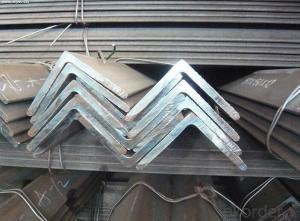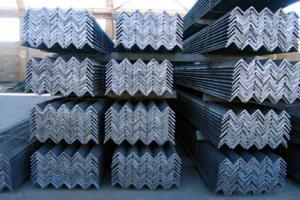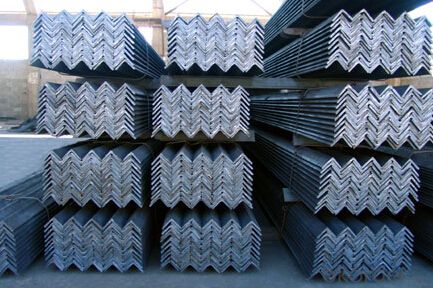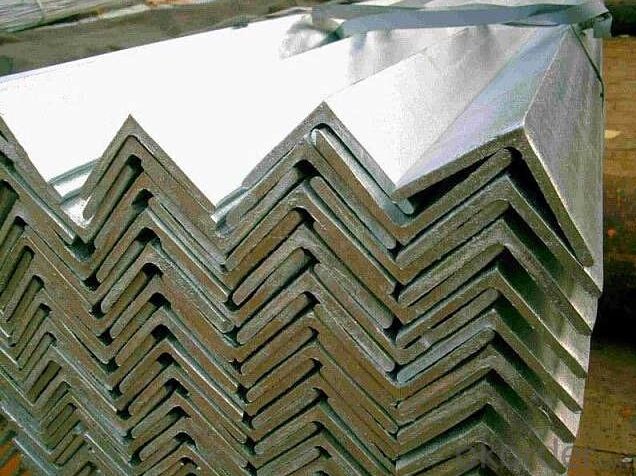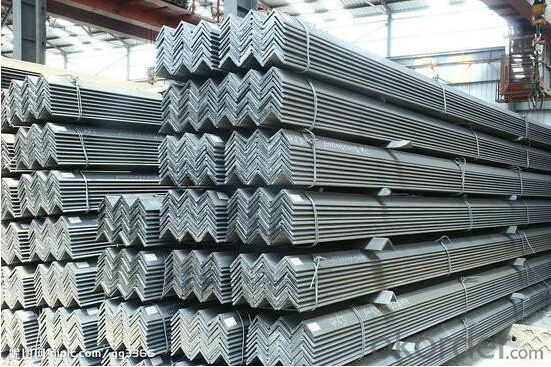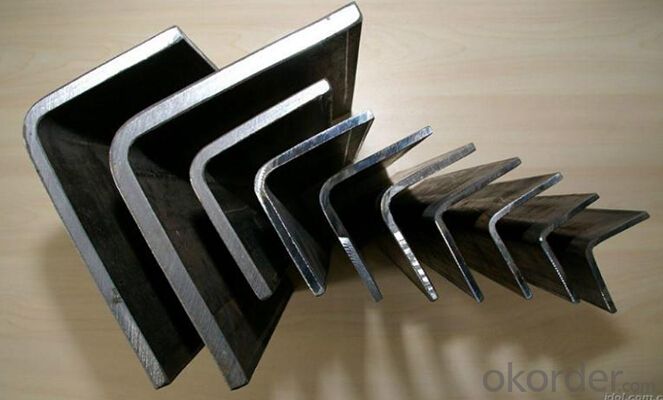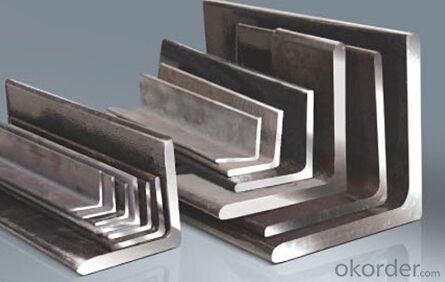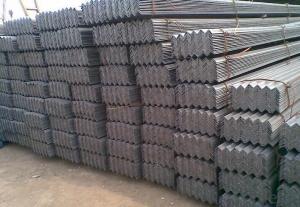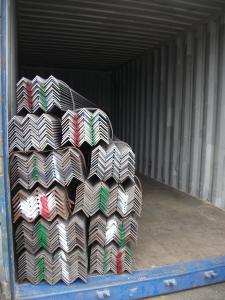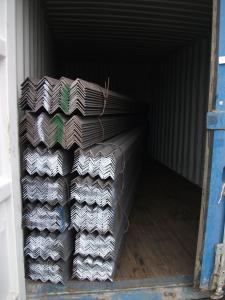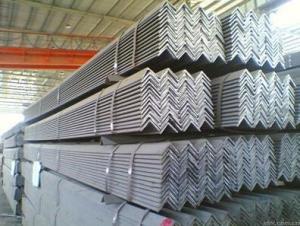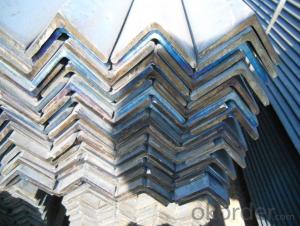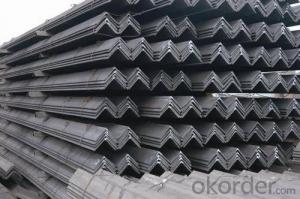Equal-Unequal Black & Galvanized Steel Angle Bar
- Loading Port:
- Tianjin
- Payment Terms:
- TT OR LC
- Min Order Qty:
- 3 m.t.
- Supply Capability:
- 10000 m.t./month
OKorder Service Pledge
OKorder Financial Service
You Might Also Like
Specification
Detailed Informaion
Name | Equal/Unequal Angle Steel Bar |
Shape | Equal/Unequal Angle |
Standard | GB/ASTM/SAE/AISI/DIN/JIS/EN/BS |
Surface Treatment: | Black/Peeling/Polished/Machined |
Delivery Condition: | Hot Rolled or Forged/Peeled or Black Surface |
Test | SGS/UT 100% Elements Testing |
Certificate: | ISO/Mill Certificate |
Service: | 24 hours online service / |
more than 20 years trading and manufacture | |
Quality Assurance: | the third party inspection, such as SGS, BV, TUV…etc. is acceptable |
Packaging Details: | Seaworthy Packaging or as per customer's packing instruction |
Specification
Specification | Weight | Specification | Weight |
Leg length*leg length*thickness |
| Leg length*leg length*thickness | (kg/m) |
(mm) | (kg/m) | (mm) |
|
25*25*3 | 1.124 | 90*90*8 | 10.946 |
25*25*4 | 1.459 | 90*90*10 | 13.476 |
30*30*3 | 1.373 | 100*100*6 | 9.366 |
30*30*4 | 1.786 | 100*100*7 | 10.83 |
40*40*3 | 1.852 | 100*100*8 | 12.276 |
40*40*4 | 2.422 | 100*100*10 | 15.12 |
40*40*5 | 2.976 | 100*100*12 | 17.898 |
45*45*3 | 2.088 | 110*110*7 | 11.928 |
45*45*4 | 2.736 | 110*110*8 | 13.532 |
45*45*5 | 3.369 | 110*110*10 | 16.69 |
50*50*3 | 2.332 | 110*110*12 | 19.782 |
50*50*4 | 3.059 | 125*125*8 | 15.504 |
50*50*5 | 3.77 | 125*125*10 | 19.133 |
50*50*6 | 4.465 | 125*125*12 | 22.696 |
63*63*5 | 4.822 | 125*125*14 | 26.193 |
63*63*6 | 5.721 | 140*140*10 | 21.488 |
63*63*8 | 7.469 | 140*140*12 | 25.522 |
70*70*5 | 5.397 | 140*140*14 | 29.49 |
70*70*6 | 6.406 | 160*160*10 | 24.729 |
70*70*7 | 7.398 | 160*160*12 | 29.391 |
70*70*8 | 8.373 | 160*160*14 | 33.987 |
75*75*5 | 5.818 | 160*160*16 | 38.518 |
75*75*6 | 6.905 | 180*180*12 | 33.159 |
75*75*7 | 7.976 | 180*180*14 | 38.383 |
75*75*8 | 9.03 | 180*180*16 | 43.542 |
75*75*10 | 11.089 | 180*180*18 | 48.634 |
80*80*6 | 7.376 | 200*200*14 | 42.894 |
80*80*7 | 8.525 | 200*200*16 | 48.68 |
80*80*8 | 9.658 | 200*200*18 | 54.401 |
80*80*10 | 11.874 | 200*200*20 | 60.056 |
90*90*6 | 8.35 | 200*200*24 | 71.168 |
90*90*7 | 9.656 |
|
|
Company Introduction
CNBM International Corporation is the most import and export platform of CNBM group(China National Building Material Group Corporation) ,which is a state-owned enterprise, ranked in 270th of Fortune Global 500 in 2015.
With its advantages, CNBM International are mainly concentrate on Cement, Glass, Iron and Steel, Ceramics industries and devotes herself for supplying high quality series of refractories as well as technical consultancies and logistics solution.
Packaging & Delivery
Packaging Detail | Sea worthy packing /as per customer's packing instruction |
Delivery Detail | 15 ~ 40 days after receiving the deposit |
Product Show
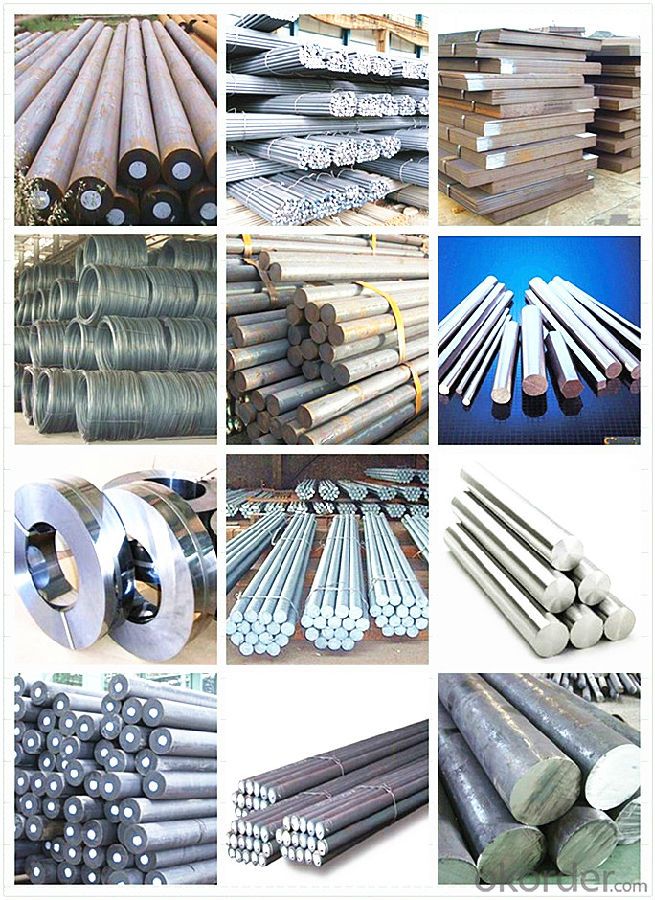
FAQ
Are you a trading company or manufacturer? | Manufacturer |
What’s the MOQ? | 3 metric ton |
What’s your delivery time? | 15-35 days after downpayment received |
Do you Accept OEM service? | Yes |
what’s your delivery terms? | FOB/CFR/CIF |
What's the Payment Terms? | 30% as deposit,70% before shipment by T/T |
Western Union acceptable for small amount. | |
L/C acceptable for large amount. | |
Scrow ,Paybal,Alipay are also ok | |
Why choose us? | Chose happens because of quality, then price, We can give you both. |
Additionally, we can also offer professional products inquiry, products knowledge train (for agents), smooth goods delivery, excellent customer solution proposals. | |
What's your available port of Shipment? | Main Port, China |
What’s your featured services? | Our service formula: good quality+ good price+ good service=customer's trust |
Where are your Market? | Covering more than 160 countries in the world |
- Q: How does special steel contribute to the telecommunications aftermarket industry?
- The telecommunications aftermarket industry heavily relies on special steel to manufacture and maintain telecommunications equipment. This type of steel is specifically designed to possess exceptional properties, such as high strength, corrosion resistance, and durability, which are crucial for the demanding conditions of the telecommunications sector. One of the main contributions of special steel to the telecommunications aftermarket industry is its use in the production of communication towers and transmission structures. These structures must endure extreme weather conditions, such as strong winds and heavy loads, while providing reliable support for antennas and other equipment. Special steel meets these requirements, ensuring the longevity and stability of communication towers. Moreover, special steel is extensively used in manufacturing cables and wires for telecommunications systems. These cables must transmit signals without any loss or interference, and the unique properties of special steel, such as high electrical conductivity and low resistance, make it an ideal material for this purpose. The use of special steel in cables helps maintain the quality and efficiency of telecommunications networks. Another significant contribution of special steel is its role in producing equipment enclosures and cabinets. These enclosures protect sensitive electronic components from environmental factors, including moisture, dust, and extreme temperatures. Special steel, with its corrosion-resistant properties, ensures the longevity and reliability of these enclosures, safeguarding the valuable equipment inside. Furthermore, special steel is also utilized in manufacturing various components and accessories used in the telecommunications aftermarket industry, such as connectors, brackets, and hardware. These components are essential for assembling and maintaining telecommunications equipment. Special steel's high strength and durability make it the preferred choice for these components, guaranteeing their long-lasting performance. In conclusion, special steel significantly contributes to the telecommunications aftermarket industry by providing the necessary materials for manufacturing and maintaining telecommunications equipment. Its exceptional properties, including high strength, corrosion resistance, and durability, make it an ideal choice for communication towers, cables, enclosures, and various components. By utilizing special steel, the telecommunications industry ensures the reliability, efficiency, and longevity of its equipment, ultimately benefiting both service providers and end-users.
- Q: How does stainless steel contribute to the automotive industry?
- Stainless steel contributes to the automotive industry by providing durability, corrosion resistance, and aesthetic appeal to various parts and components. It is commonly used in exhaust systems, engine components, body panels, and trim pieces, ensuring longevity and maintaining the integrity of vehicles even in harsh conditions.
- Q: How does special steel resist oxidation at high temperatures?
- Due to the presence of specific alloying elements and a carefully controlled manufacturing process, special steel is able to resist oxidation at high temperatures. When exposed to oxygen in the air, alloying elements like chromium, nickel, and aluminum form a protective oxide layer on the steel's surface. This layer acts as a barrier, preventing further oxidation. Of these alloying elements, chromium is particularly effective in forming a stable and dense chromium oxide layer. This layer serves as a self-healing mechanism, meaning that if it becomes damaged or scratched, it will quickly regenerate and continue to protect the steel from oxidation. The manufacturing process of special steel involves precise control of composition and heat treatment. This ensures that the steel has a fine and uniform microstructure, minimizing the presence of impurities or defects that could speed up oxidation. Moreover, the steel often undergoes various heat treatments, such as annealing or quenching, which further enhance its resistance to oxidation. In conclusion, the combination of alloying elements, controlled composition, and specific manufacturing processes allow special steel to withstand oxidation at high temperatures. This makes it an ideal choice for applications in industries like aerospace, power generation, and petrochemical.
- Q: How does special steel contribute to the energy storage industry?
- Special steel plays a crucial role in the energy storage industry by providing high-strength and corrosion-resistant components for the manufacturing of batteries, turbines, and other energy storage systems. It enables the production of more efficient and durable energy storage devices, improving their overall performance and lifespan. Special steel also helps in reducing energy losses during storage and transmission processes, thus contributing to the increased efficiency of the energy storage industry.
- Q: What are the different methods for annealing special steel?
- There are several methods for annealing special steel, each designed to achieve specific results and properties. Some of the most commonly used methods include: 1. Full annealing: This method involves heating the steel to a temperature above its critical temperature and holding it there for a specific duration of time. It is then slowly cooled to room temperature. Full annealing helps to achieve maximum softness and improve ductility, making the steel easier to machine and work with. 2. Isothermal annealing: In this method, the steel is heated to a temperature above its critical temperature and then immediately transferred to a furnace or chamber where it is held at a constant temperature. This allows for controlled cooling, resulting in a homogeneous and fine-grained microstructure. Isothermal annealing is particularly useful for reducing distortion and improving dimensional stability in complex-shaped parts. 3. Spheroidize annealing: This method is commonly used for high-carbon steels. It involves heating the steel to a temperature just below its critical temperature and holding it there for an extended period. This promotes the formation of spheroidized carbides, which improves machinability and reduces brittleness. 4. Process annealing: This method is typically employed to relieve internal stresses and reduce hardness in cold-worked steel. The steel is heated to a temperature below its critical temperature and then cooled in still air. Process annealing helps to restore ductility and improve formability. 5. Stress-relief annealing: This method is used to alleviate residual stresses in the steel, often caused by welding or machining processes. The steel is heated to a temperature below its critical temperature and then slowly cooled. Stress-relief annealing helps to minimize distortion and prevent cracking. It is important to note that the specific annealing method used for special steel will depend on factors such as the composition of the steel, desired mechanical properties, and the intended application of the material.
- Q: How does special steel perform in high-temperature strength?
- Special steel, also referred to as high-temperature steel, is engineered for superior performance in applications requiring high-temperature strength. Unlike standard steels, which can weaken and compromise structural integrity at elevated temperatures, special steel maintains its mechanical properties even in extreme heat conditions. The exceptional high-temperature strength of special steel stems from its distinctive composition. It is typically alloyed with elements like chromium, nickel, and molybdenum, significantly enhancing its resistance to thermal expansion, oxidation, and creep. These alloying elements form stable oxides on the steel's surface, creating a protective layer that prevents further oxidation and corrosion, thus preserving the material's strength and integrity. Furthermore, the microstructure of special steel is vital to its high-temperature performance. Through advanced manufacturing techniques, special steel is crafted with a fine-grained structure, enhancing its resistance to deformation and boosting its creep strength. The fine grains also contribute to its ability to retain mechanical properties at elevated temperatures for extended periods. Moreover, special steel undergoes rigorous heat treatment processes, such as quenching and tempering, which further enhance its high-temperature strength. These processes refine the microstructure and optimize the steel's mechanical properties, including hardness, toughness, and resistance to thermal fatigue. In conclusion, special steel is purposefully designed and engineered to excel in applications requiring high-temperature strength. Its unique composition, microstructure, and heat treatment processes contribute to its exceptional resistance to thermal expansion, oxidation, and creep, ensuring that it maintains its mechanical properties and structural integrity even under extreme heat conditions.
- Q: What are the different corrosion-resistant coatings for special steel?
- Various corrosion-resistant coatings are available for special steel, each possessing unique properties and advantages. Some commonly used coatings include: 1. Zinc Coating: Galvanizing and other zinc coatings are widely employed to safeguard special steel against corrosion. The zinc layer acts as a sacrificial barrier, preventing corrosive elements from coming into contact with the steel. 2. Epoxy Coating: Due to their exceptional adhesion, chemical resistance, and durability, epoxy coatings are a popular choice for corrosion protection. They create a robust barrier that shields special steel from moisture, chemicals, and other corrosive agents. 3. Polyurethane Coating: In harsh environments where special steel is exposed to extreme conditions, such as offshore or marine applications, polyurethane coatings offer exceptional resistance against abrasion, chemicals, and weathering. 4. Ceramic Coating: Ceramic coatings provide outstanding corrosion protection and high-temperature resistance. They are frequently used in industries like aerospace and automotive, where special steel must withstand extreme temperatures and corrosive environments. 5. Metal Coating: Nickel or chromium coatings are frequently applied to special steel to enhance its corrosion resistance. These coatings establish a protective layer that acts as a physical barrier, preventing corrosion. 6. Powder Coating: Powder coatings are electrostatically applied and then cured under heat, resulting in a hard and durable protective layer. They offer excellent corrosion resistance and can be customized in terms of color and texture. Choosing the appropriate corrosion-resistant coating for special steel is crucial and should be based on specific requirements and the environment it will be exposed to. Factors such as temperature, exposure to chemicals or moisture, and desired coating lifespan should all be considered when selecting the suitable coating.
- Q: What are the main factors affecting the machinability of special steel?
- The main factors affecting the machinability of special steel include the steel's composition, hardness, and microstructure. Additionally, factors such as cutting tool materials and geometry, cutting speeds, and feed rates can also significantly impact the machinability of special steel.
- Q: How does special steel contribute to the automotive parts industry?
- Special steel plays a crucial role in the automotive parts industry by providing enhanced strength, durability, and performance to various components used in vehicles. With its unique properties, special steel helps in improving the overall safety, reliability, and efficiency of automobiles. One of the key contributions of special steel to the automotive parts industry is its ability to withstand high temperatures, pressures, and extreme conditions. This makes it ideal for manufacturing engine parts such as crankshafts, camshafts, and connecting rods, which are subject to intense mechanical stress and heat. Special steel ensures that these critical components can endure the demanding conditions of combustion engines, resulting in improved engine performance and longevity. Another significant contribution of special steel is its corrosion resistance. Automotive parts are exposed to various corrosive elements like moisture, chemicals, and road salt. Special steel enables the production of corrosion-resistant parts such as exhaust systems, suspension components, and brake rotors, which are vital for maintaining the structural integrity and safety of vehicles over time. Moreover, special steel offers exceptional formability and weldability, allowing manufacturers to produce complex automotive parts with precision and ease. This versatility makes it possible to create lightweight yet strong components like chassis, body panels, and suspension arms, which contribute to fuel efficiency, handling, and overall vehicle performance. Furthermore, special steel's high tensile strength and toughness contribute to the safety of vehicles by ensuring the structural integrity of safety-critical parts such as steering columns, seat frames, and roll bars. These components play a vital role in protecting occupants during accidents and collisions, making special steel an essential material for enhancing overall vehicle safety. In conclusion, special steel's unique properties and characteristics significantly contribute to the automotive parts industry. Its strength, durability, corrosion resistance, formability, and weldability make it an ideal material for manufacturing critical components in automobiles. By incorporating special steel into various parts, vehicles can achieve improved performance, safety, and reliability while meeting the demands of modern automotive standards.
- Q: What are the properties of low-alloy steel?
- Low-alloy steel is a type of steel that contains a small percentage of alloying elements, typically less than 5%. These alloying elements enhance the strength, hardness, and corrosion resistance of the steel. Additionally, low-alloy steel often exhibits improved toughness, weldability, and formability compared to carbon steel. The specific properties of low-alloy steel can vary depending on the alloying elements used, but in general, it offers a cost-effective solution for applications that require high strength and durability.
Send your message to us
Equal-Unequal Black & Galvanized Steel Angle Bar
- Loading Port:
- Tianjin
- Payment Terms:
- TT OR LC
- Min Order Qty:
- 3 m.t.
- Supply Capability:
- 10000 m.t./month
OKorder Service Pledge
OKorder Financial Service
Similar products
Hot products
Hot Searches
Related keywords
